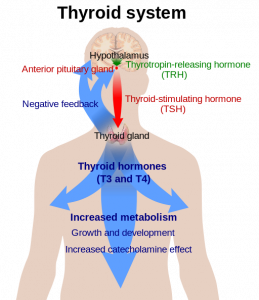Hashimoto’s disease is an autoimmune disease. It is a disease that causes underactive thyroid (hypothyroidism). The body’s own immune-system cells attack the cells of the thyroid gland and gradually break them down and destroy them. This, of course, has a detrimental effect on thyroid gland function and on important metabolic processes in the body.

Hashimoto’s is a bit tricky. In its early development and progression, there may not be any obvious symptoms. Eventually, such symptoms as fatigue and lethargy and weight gain will make themselves manifest. Hashimoto’s thyroiditis is a debilitating disease. It lessens a person’s quality of life. It tends to affect women more than men.
Of all the organs in the body, the thyroid gland has the highest concentration of selenium. It is a greedy organ with respect to selenium. An adequate intake of selenium can lessen the severity of hypothyroidism symptoms and is associated with lowered levels of autoimmune thyroid peroxidase antibodies.
Thyroid Hormone Production
In the brain, the hypothalamus secretes a thyroid-releasing hormone (TRH).
The TRH hormone then prompts the pituitary gland to produce and release thyroid stimulating hormone (TSH).
Next, the TSH from the pituitary gland stimulates the cells in the thyroid gland to release two metabolic hormones into the blood circulation:
- thyroxine or T4 (80%) – the inactive thyroid hormone
- triiodothyronine or T3 (20%) – the active thyroid hormone
At normal blood levels, the T4 and T3 hormones signal the pituitary gland not to make more TSH hormone. Whenever the T4 and T3 hormone levels fall to abnormally low levels in the blood, the pituitary gland begins to make more TSH. This results in more production and release of T4 and T3 [Cleveland Clinic 2022].
Testing for TSH Hormone Levels
Doctors use tests of the level of TSH in the blood to see whether the patient has the appropriate amounts of metabolic hormones T4 and T3. The normal adult range for TSH in the blood is somewhere between 0.30 and 4.50 international units per liter of blood. Typically, the TSH level will be somewhat higher with increasing age [Cleveland Clinic 2022].
High TSH concentrations in the blood indicate an underactive thyroid.
In hypothyroidism, the thyroid gland is not producing enough metabolic hormones to regulate important body processes. That, in turn, leads to a loss of physical fitness and a loss of quality of life [Cleveland Clinic 2022].
Individuals with Hashimoto’s thyroiditis, which is the most common form of hypothyroidism, will want to lower their TSH levels. It is possible to treat high TSH levels with thyroid medication. For this purpose, there is a synthetic thyroid hormone prescription drug called levothyroxine [Cleveland Clinic 2022].
The question is whether selenium supplementation of Hashimoto’s thyroiditis patients can affect TSH levels.
Selenium Effect in Hashimoto’s Disease Patients
In March 2024, Huwiler and a team of researchers in Bern, Switzerland, reported the results of a systematic review and meta-analysis of randomized controlled trials of selenium supplementation of patients with Hashimoto’s thyroiditis.
The pooled data came from a heterogeneous groups of study participants. The study participants comprised children, adolescents, and adults including pregnant women. The researchers reported an overall clear female preponderance in the studies. The assembled studies were conducted in Asia, Europe, the Middle East, and South America [Huwiler 2024].
- In Hashimoto’s disease patients who were not on thyroid hormone replacement therapy, the meta-analysis showed that selenium supplementation, compared with placebo supplementation, was associated with a significant decrease in TSH levels [Huwiler 2024].
- The meta-analysis showed no significant increase in free thyroxine (fT4) levels in the selenium supplementation group compared with the control group [Huwiler 2024].
- The meta-analysis showed no significant increase in free triiodothyronine (fT3) levels in the selenium supplementation group compared with the control group [Huwiler 2024].
Note: That the meta-analysis showed no significant increases in the thyroid hormones fT4 and fT3 could perhaps be attributed to the fact that Hashimoto’s disease patients not on thyroid hormone replacement therapy mostly still have fT4 and fT3 levels in the normal range [Huwiler 2024].
- The meta-analysis showed that selenium supplementation was associated with a significant decrease in thyroid peroxidase antibodies (TPOAb). In pregnant women, there were significant decreases in TPOAb levels at delivery and at five or six 6 months postpartum but no significant effect during gestation [Huwiler 2024].
Note: Elevated levels of TPO Ab thyroid antibodies are a sign of thyroid gland disorder. The higher levels of TPOAb antibodies provide an early warning that the autoimmune damage is about to begin or has begun. The increase in the TPOAb antibodies can occur far in advance of changes in TSH hormone levels.
Conclusion: Selenium and hashimoto’s disease
Selenium supplementation of Hashimoto’s disease patients was associated with reduced TSH levels, especially in patients not yet on thyroid hormone replacement therapy.
Selenium supplementation had a beneficial effect in lowering TPOAb antibody levels.
The meta-analysis showed that the selenium supplementation was safe and has potential as a disease-modifying factor for hypothyroidism associated with Hashimoto’s thyroiditis [Huwiler 2024].
Sources
Cleveland Clinic. Thyroid-Stimulating Hormone (TSH) Levels. 2022. Retrieved from https://my.clevelandclinic.org/health/articles/23524-thyroid-stimulating-hormone-tsh-levels
Huwiler VV, Maissen-Abgottspon S, Stanga Z, Mühlebach S, Trepp R, Bally L, Bano A. Selenium supplementation in patients with Hashimoto thyroiditis: a systematic review and meta-analysis of randomized clinical trials. Thyroid. 2024 Mar;34(3):295-313.
The information presented in this review article is not intended as medical advice. It should not be used as such.
30 July 2024
